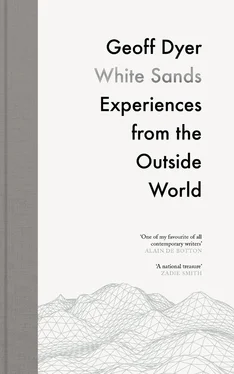I sat behind the nearest goal so that it framed the one at the far end of the pitch. There is always something pleasing about this view of the goal within a goal, whereby the goal (the far one) becomes a substitute for the thing (the ball) you are normally trying to force into it. As I sat there, looking at the goal within a goal, I thought of the album Playing by Don Cherry, Charlie Haden, Dewey Redman and Ed Blackwell. Like many ECM records this one has a striking cover: a photograph of an empty goal post, very white, backed by a wall of dark green trees (almost a forest). In front of the goal is the lighter green of the pitch, the lines of which — six-yard box, penalty area — are impossible to see. Like this the goal becomes something tangibly abstract, and the pitch almost a meadow.
I knew all the musicians on the album — that’s why I’d bought it — but knew nothing about the person who took the cover photograph. He was credited on the back cover, but I paid it no mind, and the name, in any case, would have meant nothing to me back then. It was only years later that I came properly to appreciate the identity of the photographer. I was looking through Kodachrome by Luigi Ghirri and there it was: the same picture, but as often happens in such circumstances, slightly different. The forest on the album cover had lost some detail, its implied depth, and the grass was somewhat yellowed, drier-looking, either because of faulty reproduction or because, over the years, my copy of the album had faded. The biggest change, however, was simultaneously subtler and clearer, and it was what might be called Ghirriesque.

Like many Ghirri pictures, this one is quietly but rigorously self-enclosed. The frame within the frame — the frame of the goal posts — concentrates our attention absolutely within the frame of the image (which on Playing had been framed again by the white background of the album cover). In the picture there is no narrative to suggest what might be going on either beyond the spatial frame or beyond the moment depicted, because — and this is often the case with Ghirri — there is absolutely nothing going on within it, no hint of movement. This is what a still from a dream might look like. Each picture is pellucid and infinitely mysterious, contains almost no incentive to move on, to turn the page and look at another. We are content to look and wait, to attend. The experience might, in this context, best be described as ‘Staying’—which is what I was happy to do, looking at the goal within the goal.
Under the spell of this image of recessive teleology — the goal within the goal — I saw that the intended purpose of coming to Hiva Oa (a Gauguin pilgrimage) was framed not by the lack of a larger goal but by a larger lack of goals, by an all-engulfing purposelessness. This larger lack did not mean, however, that there was no larger perspective. Such a perspective was provided by the empty pitch, whose goal was to show that everything that happened here — the human triumphs and tragedies, the manly victories and defeats — was lent meaning only as a result of its own continued non -human existence. That’s to be expected — but the pitch also induced a vision of its own demise, when it would no longer be here, when it would be indistinguishable from the vegetation that would engulf it: the long interlude of forgotten-ness that is a precondition for eventual rediscovery and reclamation. The pitch was like a forgotten photograph depicting the moment when it is remembered and rediscovered.
Uputa
Gauguin’s decision to go to the Marquesas is in keeping with the psycho-pathology of island life. ‘Polynesia’ translates as ‘many islands,’ all of which you wish you were on instead of the one you actually are on. En route to Hiva Oa we had flown over any number of paradisiacal islands and atolls. In the course of my time here I had become aware of still more islands and atolls, each of which sounded more idyllic — with finer beaches, surrounded by sea more turquoise — than every other. As I studied the guide books and brochures I began to develop a profound resentment against Gauguin, that he had come to Hiva Oa and not to Bora-Bora or Raiatea. I phoned Tahiti Tourism (who had underwritten part of my trip) and pointed out that Gauguin had actually spent a little time on Bora-Bora, but the patient lady with whom I spoke did not feel that this justified changing my itinerary. Well, how about Huahine, I said? But Gauguin did not go there, she said, sounding slightly less patient. Yes, I explained patiently, but perhaps places like this have the appeal now that Tahiti did back then. Perhaps, I said, if Gauguin had been alive now he would have gone to Taha’a Noho Ra’a and stayed in an over-water bungalow at the Pearl Beach Resort and Spa as a way of reconciling the savage part of his own nature with the contemporary need for boutique luxury. In the humid heat none of this cut any ice, and it soon became apparent that the question ‘Where are we going?’ was turning into its vexed opposite, ‘Where are we not going?’—to which the answer was: all the places I really wanted to go. Other people thought Hiva Oa was paradise, but if this was the case then it was a paradise from which I was becoming impatient to be expelled. With this in mind it seemed certain that the apple in Eden grew on the tree of knowledge of elsewhere. Up until that point Adam and Eve were happy where they were. Then they ate the apple and it was slightly disappointing to them, and they started to wonder if maybe there were other kinds of apples elsewhere, if there were crunchier and crisper and sweeter apples to be had from somewhere else. They began to think that there might be a funner place, where the food was better. They even began to suspect that paradise itself might be somewhere else. And not only that: they began to think that there might be some commercial potential in this knowledge, that it might be possible to make a living importing and exporting these apples and marketing paradise as a destination . From there, to keep the history of the world as brief as possible, it is only a small step to package cruises and supermarkets stocking the full spectrum of exotic fruit.
Increasingly, the question on my mind in Hiva Oa was ‘When can I leave?’ I had exhausted everything the island had to offer, was counting the days to my departure. There was talk of a daytrip to a place where Gauguin’s grandson or great-grandson lived. The idea was to have lunch or at least take tea or coffee with him, but it turned out that he doesn’t like foreigners and did not want to meet me. Which was fine by me, because I have some dislikes of my own and near the top of that extensive list are the sons, daughters or grandsons and granddaughters of famous parents who consider themselves special by virtue of having been born. Within that general category of detestation I reserve special contempt for those sons and daughters who, while claiming special status from the strength of their lineage, also lament the inhibiting weight of expectation bearing down on them because one or both parents achieved such renown that the pressure on the descendants to do something condemns them to doing nothing, to a life of endless weakness. So fuck you, motherfucker.
In lieu of tea or lunch with Gauguin’s heir, I joined some other tourists for a boat trip to a nearby island. The mini-van taking us to the boat was late, but this did not matter because, when we got to the port, the boat was not ready to sail. That was the thing about Hiva Oa: the huge wait to leave contained within it other little pockets of waiting, so that one was caught in an endless hierarchy of waiting. I was always waiting for the next bit of waiting, climaxing with the final day’s waiting, in which I would wait to be transferred to the airport, where I would wait for the plane taking me back to Tahiti before the wait for the enormous airborne wait of the flight back to L.A. (more waiting) and on to London itself. In a sense that is what we are here for: to wait. In Tahitian terms, to put on wait . While waiting, however, one necessarily ponders other questions, questions that don’t go away irrespective of how long one waits: the tiki questions, the questions that stay put , the same questions, according to Harrison Ford’s voice-over in the climactic scene of Blade Runner, that the replicant Rutger Hauer wanted answered, ‘the same answers the rest of us want. Where did I come from? Where am I going? How long have I got?’ But the answers to those big questions turn out be small, or at least have to be itemised in detail if they are to have any chance of doing justice to the big questions. We are here to accrue unredeemable air miles and tier points, to try to be upgraded on aeroplanes and in hotels whenever possible, to try to alter our itineraries to include Bora-Bora and Huahine and to wish that the Internet connections were faster and more reliable. We are here to suffer terrible disorientation and jet lag and to be plagued constantly by the desire to be somewhere else, either somewhere else in French Polynesia or, ideally, somewhere else altogether, preferably nearer home. We are here to wish we had brought different books to read and to wonder what happened to our biography of Gauguin. We are here to wish the food was better and to be afflicted by the torment of heat rash and to wish that we had brought some calamine lotion to lessen that torment. We are here to buy presents for our loved ones and then to spend long hours constructing excuses as to why this was impossible because everything in Tahiti is so expensive and there’s nothing worth buying anyway. We are here to be bored rigid and then to wonder how it was possible to be so bored. We are here to wait at Hiva Oa Airport in the drenching humidity and to feel definitively what we have felt before, albeit only fleetingly: that we are glad we came even though we spent so much of our time wishing we hadn’t. We are here to make sure our seatbelts are securely fastened, our tray tables stowed and our seats are in the upright position before take-off and landing. We are here to go somewhere else.
Читать дальше













